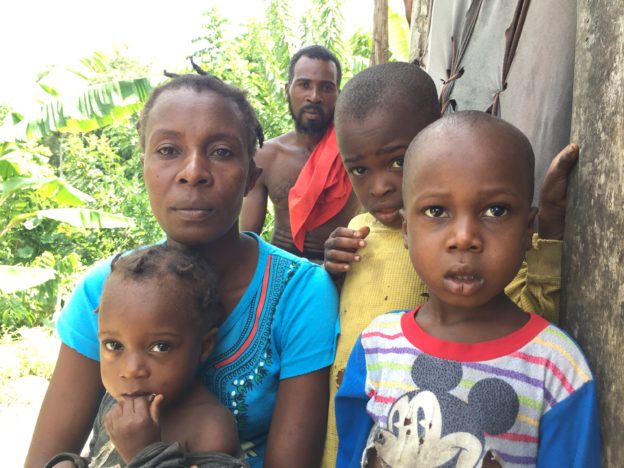Mimose and her husband Osène live with their four children in Mazonbi, an isolated community sitting on one of the jagged ridges that separates the Central Plateau from the plain to its south. Mazonbi is sparsely populated and strictly agricultural. The secondary ridge it sits on twists northward along a steep, rocky path from the primary ridge in Gran Boulay.
She joined the CLM program with the group of 360 families in southern Mirebalais that graduated in December 2014. But Mimose did not graduate.
This surprised us. When we evaluated her after twelve months, she scored as ready to graduate. She had been flourishing. But her inability to meet our graduation criteria after 18 months had a lot to do with timing and bad luck.
Midway through her 18 months in the program she became pregnant. In the program’s last months, she had to discontinue her small commerce. Her pregnancy made it impossible to get her merchandise to market. Even the small markets nearby were too far for her to hike to with a load of merchandise on her head. And a series of setbacks left her without goats. A neighbor killed three of hers in a dispute with Osène, and negotiations for recompense left them with only two much smaller ones. Both of these died within a couple of months. At graduation, she and Osène had almost nothing.
Even so, after 18 months in the program she showed a sense of progress. The baby boy she had had when she started CLM had been consistently sickly. With her case manager’s advice, however, she learned how to get him the medical attention he needed. He started on the program of fortified peanut butter used to treat malnutrition in Haiti, and by the time Mimose left CLM, he was healthy most of the time. The family also had a two-room house with a good tin roof instead of the rickety, leaf-covered shack they had lived in previously.
She and Osène are hardworking farmers, and before long things were beginning to look up again. They made a commitment to family planning so that their four children wouldn’t become five, six, or more. Their first bean harvest after graduation was strong. They were able to use it to buy a cow, and soon the cow had a calf behind it. When her baby was ready, Mimose returned to small commerce using income from their farming as capital. “I really like having a small business. It helps me out. I use it to keep my family fed.” Almost a year after graduation, she was even able to send her older children to school for the first time. And within another year, the couple had made another important purchase: they used income from a harvest to buy a horse. It could have been life-changing because Mimose would no longer have to carry her merchandise to market on her head, but the pregnant mare died shortly after they bought it.
Soon they confronted a new opportunity. A neighbor offered them a chance to buy a half an acre of farmland. They jumped at the chance, managing a down payment out of farm income. When the same neighbor offered another half-acre next to what they had already purchased, it was a more difficult decision. They didn’t have the cash. But they decided to take a risk. They sold the cow and its calf for 30,000 gourds, or about $500. They would owe a little bit – about $125 on the total for the entire acre – but the seller was willing to wait.
Farming all that land would be expensive, and they made a second risky decision. At the beginning of 2017, they took all the capital in Mimose’s business and invested it in planting their crops. They bought seeds, and they paid and fed a team of neighbors to help them. They planted the entire plot.
Last week, things took an unfortunate turn. Though Hurricane Irma missed Haiti, there were heavy rains in spots. The farmland in Mazonbi is steep and rocky, and the downpour washed through their garden, taking most of their potential harvest with it.
With neither livestock nor a small commerce, they’ll need the little bit that remains just to feed their kids through the fall. Once the year’s avocado harvest is over, they are unlikely to get much more out of their land that they can sell. Osène will have to work in their neighbors’ fields this fall just to raise enough money to plant again next spring. And they are suddenly uncertain where the money for the final payment on their land – due in December – will come from. What troubles Mimose the most, however, is that she won’t be able to send her children to school this year. “I was counting on the harvest to buy uniforms and books and to pay their school fees.”
Looking ahead, the family should be in good shape. Osène is currently ready to put a crop of sweet potatoes in the ground, and they have other plans to get by until their next harvest. But without the diverse investments that the CLM program encourages its members to make, Mimose and Osène are destined to have a difficult few months.
